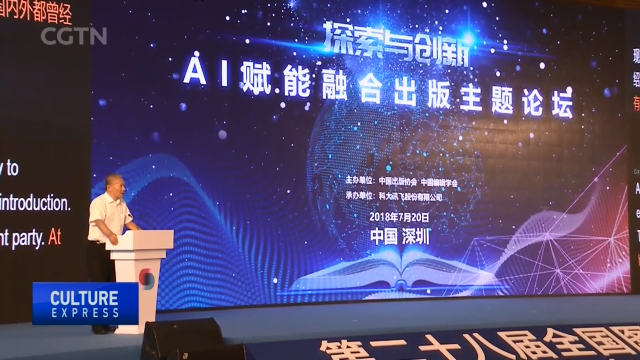
18:50, 23-Jul-2018
Future of Reading: AR provides better reading & learning experience
Updated
18:02, 26-Jul-2018
02:14

Reading on digital devices has become more and more popular. This year's National Book Expo joins the trend by including digital content, online reading and other innovative gadgets. Shen Li went to a forum in Shenzhen on how new technologies like AI and AR can help shape the publishing industry of the future.
If you're someone who loves to read, you've probably read a book that seemed to pull you into a different world. Augmented reality is similar in its ability to do that, which is why it makes sense that the two elements would be combined to create an immersive new way of reading. And AR in reading and publishing is now a hot topic here at the 28th National Book Expo.
PROFESSOR ZHOU RONGTING UNIVERSITY OF SCIENCE & TECHNOLOGY OF CHINA "AR or augmented reality is now widely used in the publishing industry. The technology really took off in 2015, and over the past few years we've seen innovative approaches to this. There's an encyclopedia in the UK, a best-seller actually, which combines AR with the text, so readers can see the content more vividly. And we're also exploring with AR in reading. For example, you can scan the QR code on the pages, and the images would come alive or become a video game, teaching children maths or showing chemicals' reactions."
Apart from AR, the use of artificial intelligence or AI is also trending in the publishing industry.
WU SHULIN STANDING VICE CHAIRMAN, CHINESE PUBLISHING ASSOCIATION "AI can actually help cut isolation in publishing. For instance, you buy the certified textbooks, you can scan the QR code and you get an AI tutor that will help you with the questions and support your learning process. It's gradually becoming a common practice in the industry."
The constant advancements in the Internet and digital industry mean that what we read and how we read it may change, but the simple joy of reading itself has stayed the same. SL, CGTN.

SITEMAP
Copyright © 2018 CGTN. Beijing ICP prepared NO.16065310-3
Copyright © 2018 CGTN. Beijing ICP prepared NO.16065310-3